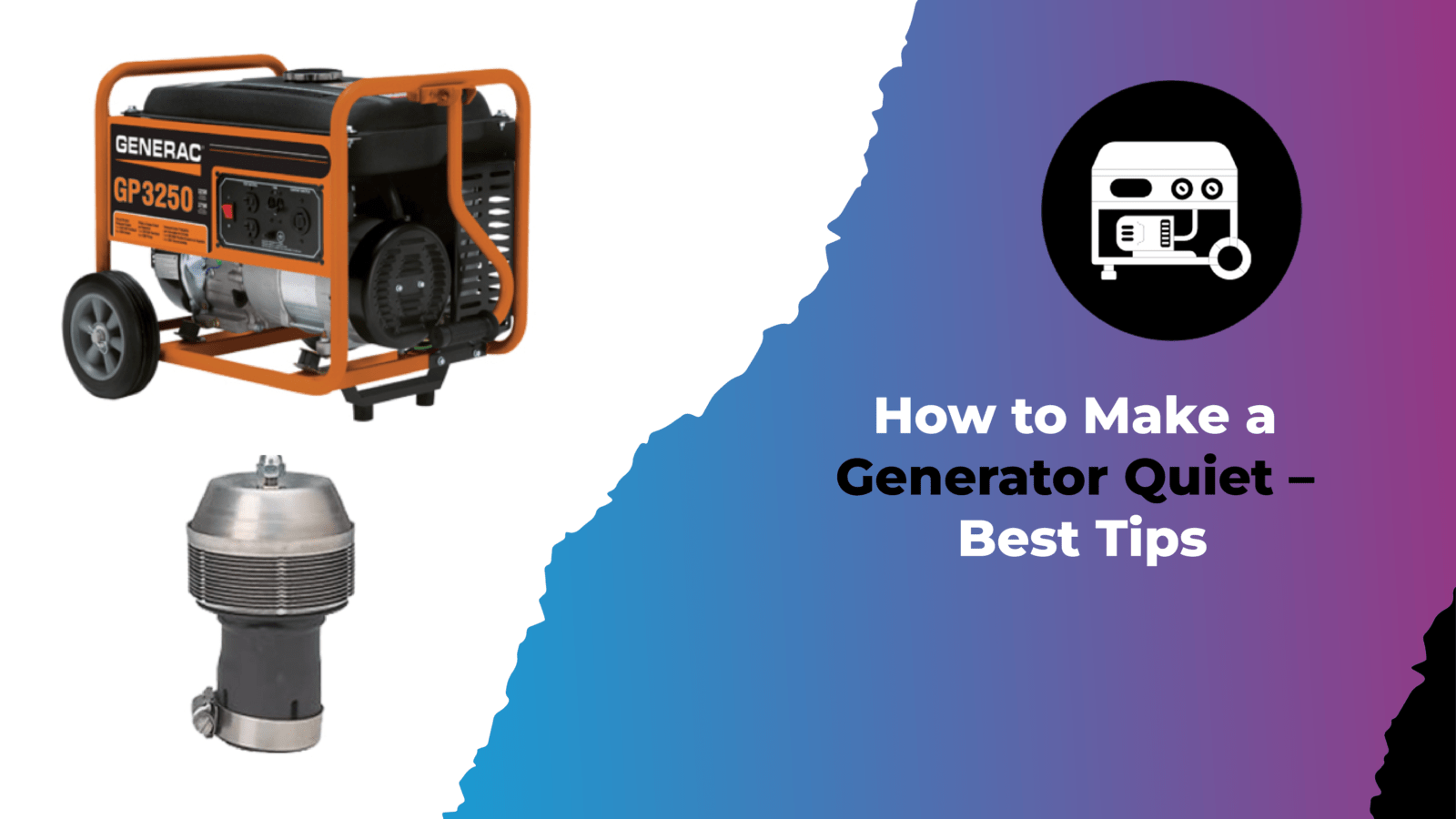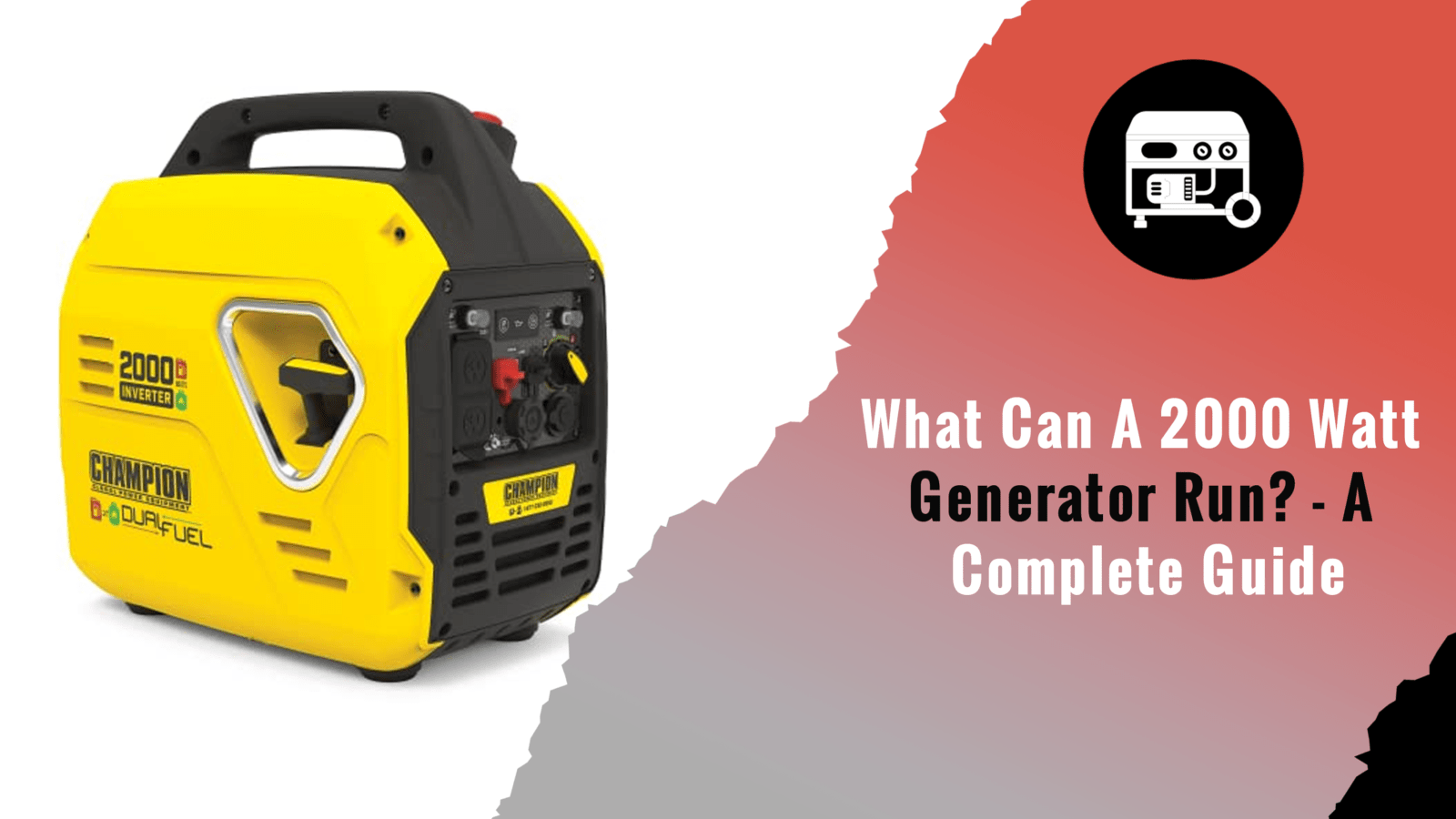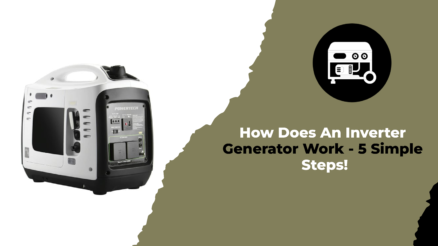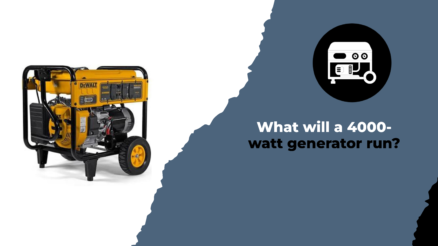Generators may be a very useful tool when camping in your travel trailer or RV. Whether you use your generator for simple tasks like charging your phone or larger ones like powering appliances, they may be incredibly useful while enjoying the great outdoors.
The disadvantage of utilizing a generator to provide these creature luxuries on your camping vacation is, of course, the noise it produces.
You’ve come to the correct site if you’ve ever wondered ‘how to quiet a generator.’ We’ll go through the 10 leading strategies for quieting a generator so you may enjoy a more pleasant camping experience without missing out on the necessities.
How to Make a Generator Quiet – Tips
If you’re in a hurry, here are my top ten ideas for making a generator quiet:
- Buy a new muffler
- Use rubber feet
- Build a soundproof generator box
- Install sound deflectors
- Redirect the exhaust away from you
- Move your generator far away
- Make a DIY muffler
- Put your generator in an outhouse
- Make a water muffler
- Buy a new generator
Why are Generators Loud?
Generators are noisy because, at their most basic, they are engines. As a result of producing energy, a generator, like other motorized equipment, creates noise. Generators feature mechanical parts and combustible engines, which all produce noise.
Typically, generators use gasoline engines to convert mechanical energy into electrical energy. Modern designs employ electromagnetic induction to either directly transmit electricity or charge a battery.
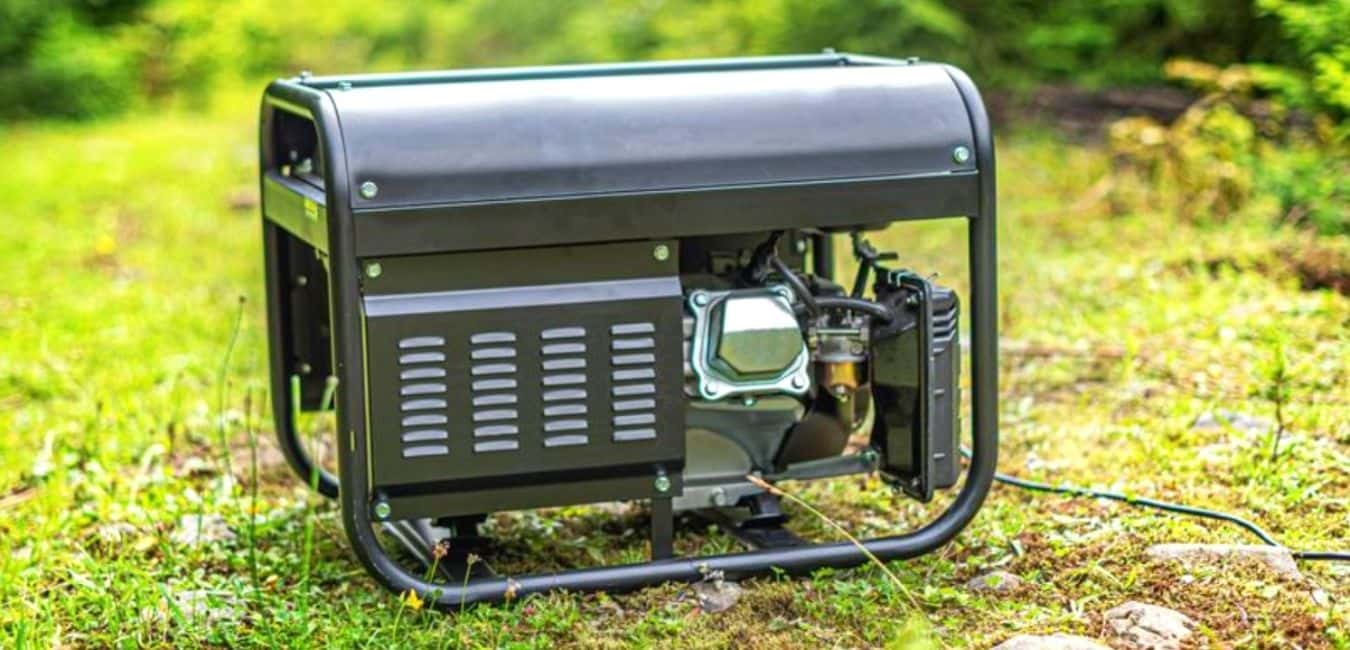
The engine and exhaust are the two most important generator noise sources.
Engine
Mechanical energy is provided by the generator’s engine. It uses fuel (usually gas) to operate pistons that are connected to an alternator. However, we don’t need to go into too much detail on the inner workings of a generator engine.
What we are interested in is the type of sound generated by a generator engine. The sound is impacted because the generator’s waste energy is kinetic (vibrations). These vibrations go through the generator and into the adjacent buildings, as well as through the generator’s feet and then into the floor.
Read More: How to Reduce Generator Noise
Exhaust
The generator’s exhaust is mostly used to vent waste gas, but it also generates sound. High-pressure gas inside the engine causes these sounds. As it escapes via the exhaust, it may make a popping or spitting sound.
The engine generates impact sound, but the generator’s exhaust generates airborne sound.
How Many Decibels is a Generator?
A generator’s overall decibel level is controlled by a number of variables, but it should be between 60dB and 100dB. Because of their higher weight and size, backup (permanent) generators are frequently calmer than portable generators, resulting in fewer noise emissions.
In addition to size and kind, consider construction quality. While strong generators produce noise, low-quality generators are almost always louder. Because the pieces are of poorer quality, they might vibrate more easily.
Finally, the power output of the generator must be considered. A 50kW generator may emit roughly 85dB, whilst a 1,500kW generator may produce up to 105dB. In summary, there is a lot of control over the noise level of a generator. The main thing to remember is that if you think it’s too loud, you should silence your generator.
How to Make a Generator Quiet?
So, how can you get your generator to be silent? Here are my top recommendations.
1. Buy a New Muffler
Even if your generator already has a muffler, it doesn’t imply it’s the ideal one for the purpose. There are several varieties of silencer mufflers available, each with its own set of internal components.
A muffler works by lowering the pressure in the exhaust system. There are elements like holes and bent tubes inside the muffler. Going through this “maze” decreases air pressure, which minimizes noise emissions. For additional information, watch this video about how mufflers operate.
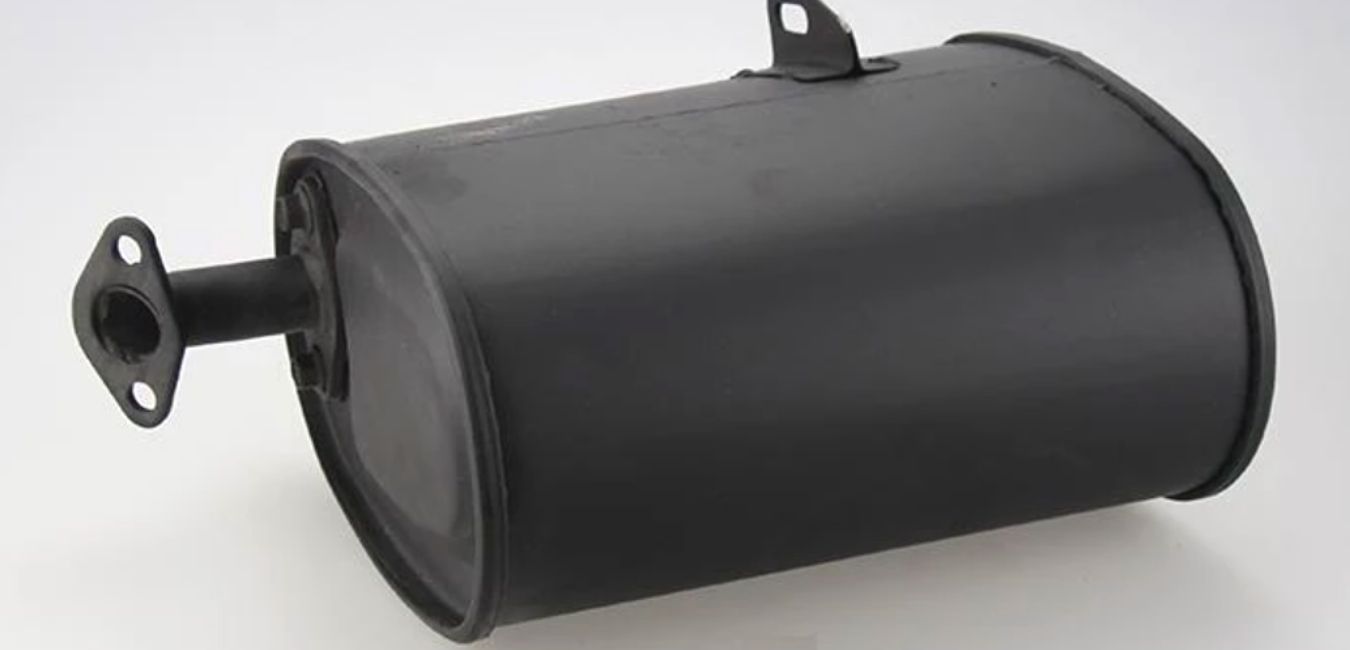
Changing your present muffler with a silencer may significantly reduce generating noise. It can lower noise emissions by up to 15dB depending on the muffler.
Many generator manufacturers will make backup mufflers for their models. If that isn’t a possibility, universal silencer mufflers are widely available. If the diameter is incorrect, it will not fit.
In a pinch, you might utilize a muffler from a vehicle or motorcycle. However, these are frequently not the correct exhaust diameter and hence won’t assist much.
Check More: How To Turn on Your Generator
2. Use Rubber Feet
Place your portable generator on rubber feet to reduce impact noise (such as these). They aid in the absorption of vibrations, resulting in less annoying noise entering your house (or camping site). Foam mats, like rubber feet, serve the same purpose.
Rubber mats or mass-loaded vinyl might potentially be used to absorb vibrations. Because hard structures are effective vehicles for sound waves, placing your generator on a concrete platform will be more beneficial.
If it’s sitting on the grass or soft ground, you shouldn’t have much of a problem because these surfaces diminish the energy of the waves and hence sound transmission.
3. Build a Soundproof Generator Box
Building a soundproof generator box is one of the most effective alternatives. Its purpose, also known as a baffle box, is to absorb or attenuate sound waves near the source.
You will need the following materials to construct a soundproof housing for your generator:
- Lumber
- Mass loaded vinyl
- Green Glue
- Acoustic foam or foam mats
- Mass Loaded Vinyl Sheet
- Green Glue Damping Compound
- Acoustic Foam Panels
Essentially, you must construct a box large enough to house your generator. Inside, staple or screw a layer of mass-laden vinyl down and fill up gaps with Green Glue. Make careful you use screws or washers with a broadhead. Also, don’t be afraid to add a lot of support points to keep the thick layer of MLV in place.
Then, place some acoustic foam on top. Green Glue should not be used for this since it might clog the open structure of the foam. Use spray adhesive instead. Of course, openings for the exhaust and air intake must be left. Failure to do so will result in the generator overheating and breaking.
A generator box is an excellent way to lessen the noise produced by your generator.
Read It: How to Flash a Generator?
4. Install Sound Deflectors
Another form of baffle box that lowers noise emissions is the sound deflector. A baffle box mechanism can be found in earlier silencer designs. Waves bounce off partitions in a typical baffle box, altering their direction.
For a generator, however, we only need to construct an enclosure that deflects sound waves. You might build it out of commonly accessible materials such as plywood and then cover it with mass-laden vinyl or sound-deadening carpets.
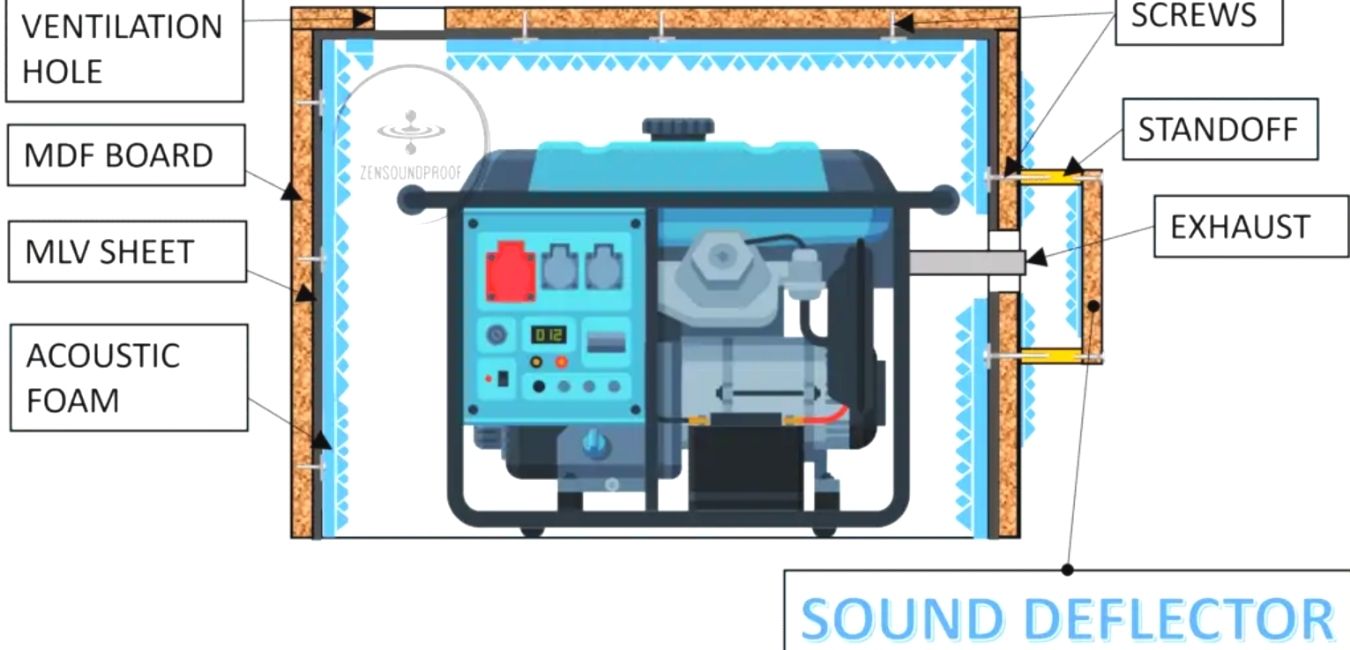
The idea is to deflect and/or reduce sound waves so that they cannot be heard from your home or campsite. Place them in a fan or labyrinth pattern between the generator and your house.
OPTION A: Install a sound labyrinth near the generator enclosure’s air intake.
OPTION B: Add a sound deflector to the exhaust hole.
While this will not make your generator as silent as cricket, it will assist reduce airborne noise pollution. It’s not about noise reduction, as the name indicates.
5. Redirect the Exhaust Pipe
If you don’t have the materials to create a soundproof box or enclosure, this is a simple remedy. It also only works with airborne noise, thus it won’t assist with the vibrations created by the generator engine.
All you have to do is direct the exhaust from the generator away from you. Begin by angling this end of the generator away from you and, if feasible, redirecting the pipes. You have the option of pointing them directly up or in the opposite direction as you. However, because it does not actively apply any sound-reduction techniques, it is not the ideal answer for how to quiet a generator.
I’d only recommend this method if you’re in a rush and don’t have any noise-canceling materials on hand.
Check This: How To Make a Generator Safe For Electronics
6. Move your Generator Far Away
Another straightforward alternative is to relocate your generator away from your home. Technically, sound intensity is inversely related to the square of the distance between the source and the listener. In short, the farther you go away, the quieter it is.
As a result, keep your generator away from your house or RV. Granted, this concept has certain restrictions, such as the size of your backyard or camping site.
You might also consider purchasing a generator extension cord so that you can continue to use it.
As with the last recommendation, it’s important to think about your neighbors while implementing this approach. After all, it’s not fair to make someone else’s noise pollution your concern.
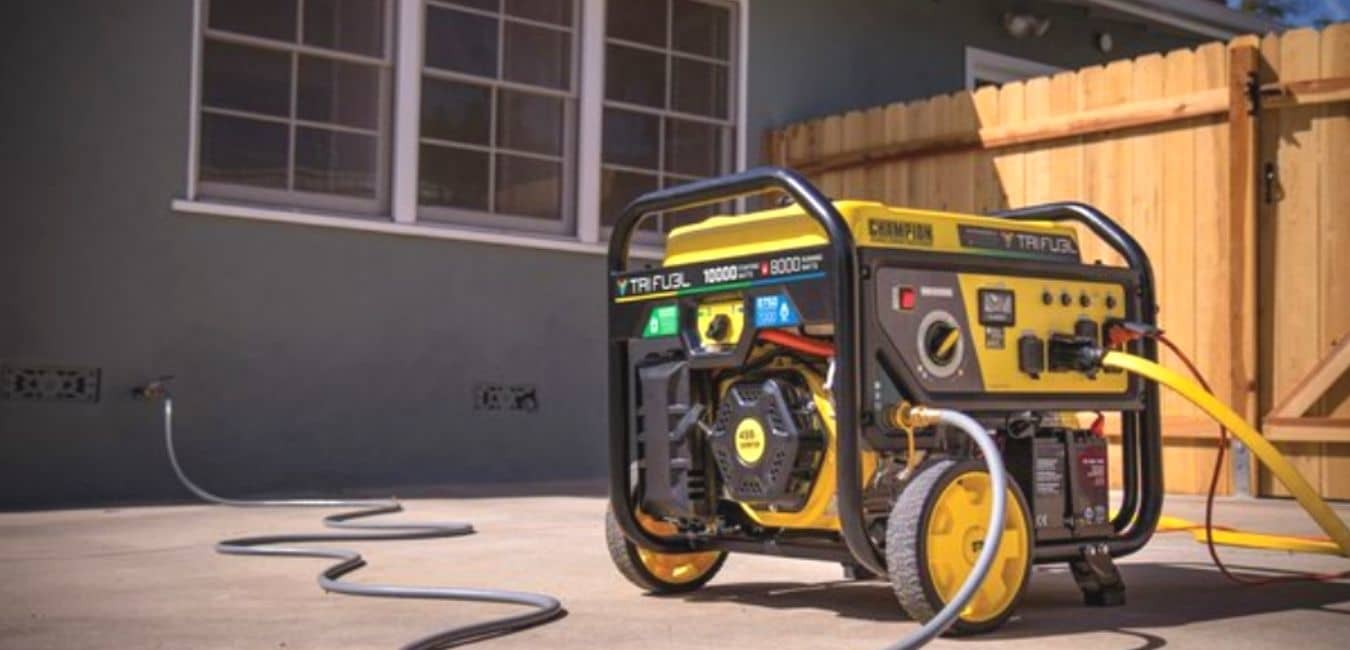
7. Make a DIY Muffler
You may also design your own silencer to make your generator quieter.
The individual in the video utilizes gun-safe legs as the tube, and it’s reasonable to assume that most people don’t have them sitting around. In principle, any metal tube of the appropriate diameter will suffice.
However, I recommend simply purchasing one. They’re not pricey, as you can see from the links above. Most firms manufacture mufflers to fit their goods, or you may purchase universal mufflers.
It is not only usually less expensive than a do-it-yourself alternative, but it is also often safer. You don’t have to be concerned about it overheating or causing damage to your generator.
8. Put Your Generator in an Outhouse
If you have a generator at home and an outbuilding on your property, place the generator inside it. This functions in the same way as the soundproof box, except that there is no need to worry about air input. Another option is to simply relocate your generator away from your home.
Most sheds aren’t designed to be soundproof. At best, yours will be fashioned of breezeblocks, though wood is more likely. Neither of them is well-known for its soundproofing capabilities.
If your shed is empty, you should surely address the issue of echo.
In a shed, overheating should be minimal, but don’t forget about the fumes. It won’t be a big deal if you’re not sleeping in the shed, but try drilling some air holes in the shed wall.
Read This: How Big Of a Generator Do I Need To Run My House?
9. Make a Water Muffler
A water muffler is the last option for minimizing generator exhaust noise.
It’s a short fix that should lower noise levels, but I wouldn’t advocate it in the long run. After all, water and electricity aren’t exactly great friends.
All you have to do is place the pipe in a bucket of water. The simplest method to accomplish this is to fasten a segment of garden hose to the pipe. The other end can then be placed in a pail of water. Gases will continue to escape, but the sound will be muffled by the water.
The advantage of utilizing a hosepipe is that it allows you to keep the water bucket away from the generator. Also, make a few holes in the hose to decrease the possibility of backflow.
10. Buy a New Generator
This is, perhaps, quite an apparent approach, but it works. Newer generators are often more fuel-efficient, which contributes to increased noise emissions. As with most mechanical equipment, newer is typically better.
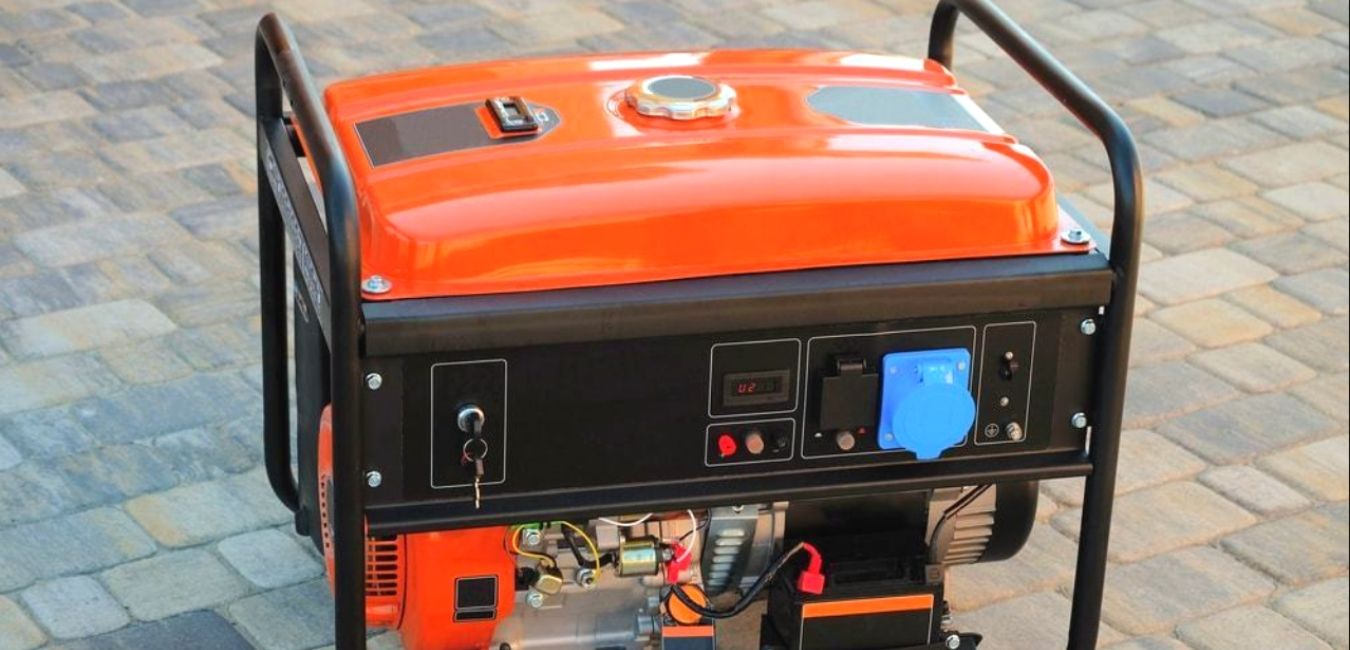
When was the last time you changed your generator? If it has been more than ten years, it may be time to upgrade. However, consider the size of the generator that you truly require. As I previously stated, there is a relationship between generator power output and noise levels.
You can get away with a 2.4kW portable generator or less for an RV with no AC. With AC, you’ll need something more powerful. Although larger is frequently better, this is not always the case with generators. Larger generators are louder, in addition to being heavier. So, when purchasing a new generator, keep to a power range that is acceptable for your needs in order to reduce needless noise.
If at all possible, use an inverter generator. They are by far the quietest generators available.
Some Final Tips
Making your generator quieter might be as easy or as difficult as you want it to be. Regardless of the strategy you pick, keep these last considerations in mind to ensure that your option is as efficient as possible.
- Soundproofing is all about plugging holes, but don’t take this too literally. Generators require adequate airflow, and the last thing you want is for it to catch fire because you thought it was too loud.
- You’ll never be able to completely soundproof your generator, so be smart about how you go about decreasing its noise. If you’re planning to use a generator while camping, be sure it’s not too far away from your campground that it bothers someone else.
- Check to see whether your generator is making a lot of noise because it’s broken. Get it serviced before attempting to make it quieter, since you may be masking a problem.
Which one is the best quietest generator?
If you’re looking for a quiet generator for camping, I recommend the Honda EU2000i. According to Amazon, this generator is the best little portable generator available.
The pros are that it operates incredibly quietly. It weighs only 46 pounds when empty, making it easy to transport to a campsite. Honda’s EU2000i generators offer good performance as well since they can operate for around 8 hours on 1 gallon of fuel, which means you won’t have to keep a lot of gasoline in the RV.
The sole disadvantage of the Honda EU2000i is that it only provides 2,000 watts.
How Do I Know If My Generator Is Overheating?
When a generator overheats, it becomes louder, and it will also run its fans excessively to try to cool down. Check on your generator on a frequent basis to ensure it hasn’t grown unduly loud.
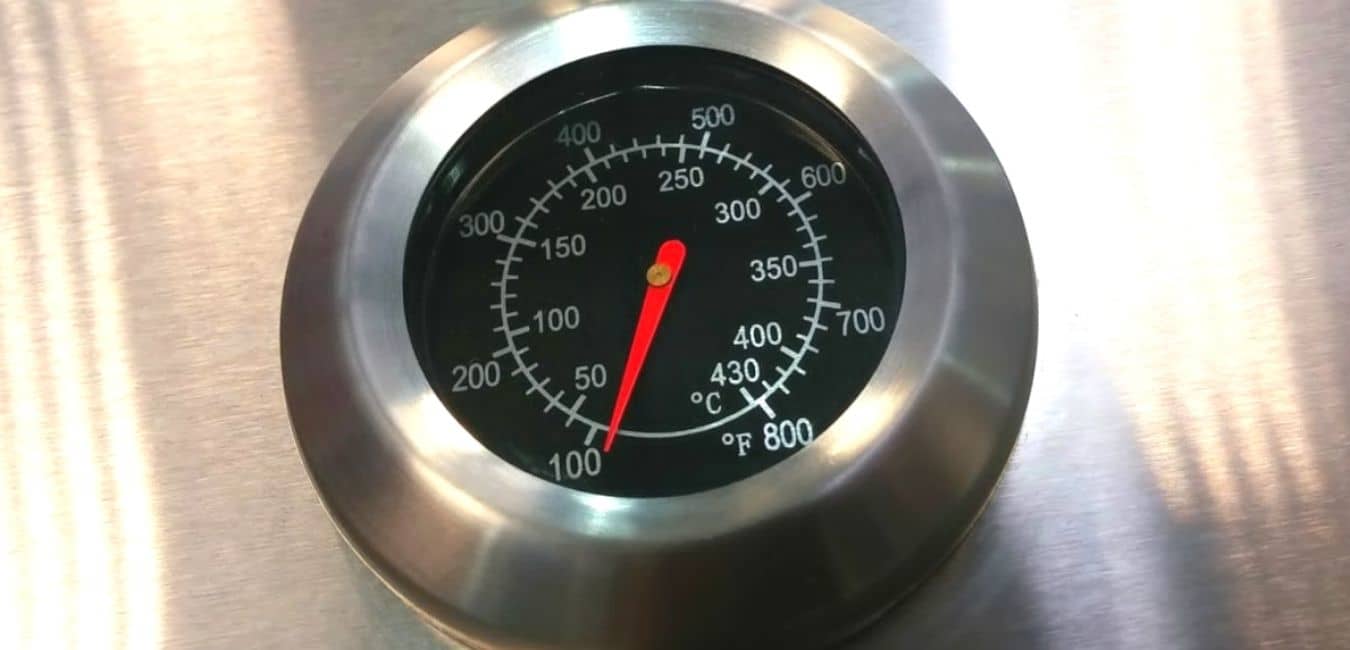
Before using your quieting tactics, let your generator run for a bit. This will help you learn what it should sound like and will help you detect when it is overheating.
Never completely cover the exhaust or fan. If you’re putting your generator in a box, leave a few additional inches around the edges. If you cover it with a blanket, be sure it doesn’t hide the fan or exhaust.
It’s also a good idea to keep a fire extinguisher nearby in case of an emergency.
How To Quiet A Generator – FAQs
To Sum Up
In short, there are several alternatives available to you if you wish to quiet your generator. There are several solutions available to lower the running noise of your generator, ranging from basic to sophisticated.
By combining each of these ten generator quieting strategies, you may significantly reduce the overall noise level of your generator and, by implication, your camping site.
We hope that this post has helped you make your camping location a little calmer. Enjoy your camping trip!


